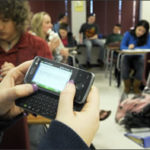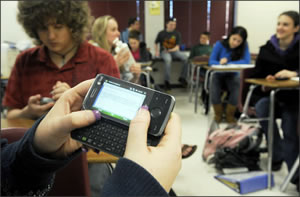
Two years ago, public high schools in North Carolina began an education technology pilot to determine whether smart phones, in conjunction with curriculum resources, could be leveraged to increase student math comprehension. Now, teachers are saying that not only have math test scores increased, but student achievement has increased in other subject areas as well.
The program, called Project K-Nect, was designed to create a supplemental resource for secondary at-risk students to focus on increasing their math skills with the help of mobile smart phones. Ninth graders in several public schools in North Carolina received smart phones to access supplemental Algebra I content aligned with their teachers’ lesson plans and course objectives. The phones and service are free of charge to the students and their schools, thanks to a grant provided by Qualcomm as part of its Wireless Reach initiative.
Student smart phones have 24/7 internet access, which students can use at home or at school, and they have full access to both the K-Nect curriculum, as well as features such as instant messaging (IM), video and chat capabilities, and calculators.
“Everyone thought this program might just last a semester,” said Suzette Kliewer, a math teacher at Southwest High School, one of two high schools in Onslow County, N.C., participating in K-Nect, “but it’s lasted for three [school] years now. It’s been approved for this upcoming year, too.”
Project Tomorrow, a national education nonprofit organization that provides consulting and research support to school districts, government agencies, and businesses about key trends in education, was asked by Digital Millennial Consulting (developer of K-Nect) to assess the program’s efficacy.
Project Tomorrow released a report of its findings earlier this month. The report presents the views of 78 students and four teachers who participated in the program between August 2009 and January 2010.
Project Tomorrow found that by using smart phones as part of the program, students are more successful on their North Carolina End of Course assessments, along with many other positive effects. Data were collected through on-site classroom observations, focus groups with students (pre- and post-semester), interviews with teachers (pre- and post-semester), and interviews with principals and technology coordinators.
K-Nect students are “more likely to achieve proficiency in Algebra and Algebra II than [other] students in their school, district, or state,” says the report.
Overall, a greater number of K-Nect students at Southwest High School demonstrated proficiency on the End of Course exams in Algebra (91 percent), Geometry (90 percent), and Algebra II (81 percent).
Likewise, the report says more Dixon High School students achieved proficiency in Algebra (93 percent) and Algebra II (81 percent) than in the district or state as a whole.
Geometry K-Nect students at Dixon (65 percent) also were more likely to demonstrate proficiency on their End-Course-Assessments than students in a comparable class without smart phones (40 percent).
End-of-course assessment data and AP Calculus results for the 2009-2010 school year will be available later this summer.
“We’re extremely optimistic about the findings and what they mean for the future of smart phones in the classroom,” said Julie Evans, chief executive officer for Project Tomorrow. “Students improved their scores in math by an average of 20 percent, and this technology and wireless internet access ensures the equitable delivery of engaging instruction, bridging the persistent digital and achievement divides.”
She continued, “Project K-Nect and this report have significant new implication on how, when, and where we engage students in a learning process.”
A day in K-Nect
According to Kliewer, who’s been working with K-Nect since its inception at Southwest High School, the report by Project Tomorrow is not a glowing review of technology simply for technology’s sake: K-Nect has helped students discover their interest in learning—including her own son.
Kliewer teaches a majority of the K-Nect classes, and her husband teaches honors classes. This past fall, she taught geometry honors, which looped into Algebra II honors in the spring.
Students in the 2009-10 classes were mostly in 10th grade, with about six to seven freshman and the rest sophomores, for totals of around 25 to 26 students per class. These students will now loop into fall pre-calc and spring AP calculus (continuing with K-Nect) for the 2010-11 year.
Each class is 90 minutes long, and each class is a semester-length class.
According to Kliewer, students who come in the K-Nect program are “average” in math, and many are not on the college track. The high school is also near a military base, so students come and go.
“Students are chosen to participate in the program if they’re struggling,” said Kliewer, “and because K-Nect pushes them to achieve more, we try to put them in the program. But since many of the entry-level classes develop into honors or higher levels in second semester, students can opt in or opt out.”
The curriculum—developed in conjunction with Drexel University and the University of Florida—mainly consists of problem sets based on real-world examples.
“The first class taught was Algebra I, and we really wrote the curriculum as we went along,” said Kliewer. “Now we have established problem sets for each class; however, we’re still in the development process for Algebra II and Geometry.”
A typical day for Kliewer begins with her teaching a concept and then asking the class to complete three to four warm-up exercises. Sometimes students collaborate on the solution, and sometimes they work independently; all students then IM Kliewer their answers.
“When class first begins in the semester, it takes a few tries for students to catch on for the problem sets. I walk them through a few, but they catch on quickly and don’t require much assistance by the end of the semester,” she said.
Kliewer explained that some days students might be asked to go outside to record video examples of a concept and then explain it to the class.
“At first, the videos and explanations weren’t detailed,” said Kliewer, “so part of the learning process in K-Nect is learning through teaching. Students have to understand a concept in every way to be able to teach their peers. This is a large part of what contributes to the positive effects we’ve seen in the program.”
Because students are allowed to keep their smart phones at all times, K-Nect included MobiControl, a device management solution, to keep tabs on what students were messaging with the phones.
According to Kliewer, students are told that their phones can be monitored.
“They’re only allowed to use their phones for school-related conversations. IM is also restricted to students and teachers that are part of K-Nect. At any time, K-Nect teachers, school administrators, and even Shawn Gross [who manages the project] can look and see what a student is doing. Because students know this, they tend not to disobey the rules.”
Kliewer said there have only been a few minor infractions.
“The students consider it quite a privilege to be part of this project and are very respectful of the opportunity,” explained Evans. “They know that most kids don’t have the ability to use a smart phone within instruction in this way, and they don’t want to go back to classroom instruction the ‘old way.’ The learning environment facilitated by the devices—engaging, interactive, and self-directed—is therefore a very strong motivator for appropriate use; maybe the best motivator.”
Even though phone truancy is minimal, Kliewer’s school does not allow students to access their personal cell phones on campus.
“At first this was daunting to me, because I didn’t know how other teachers not part of K-Nect would react to students having smart phones,” said Kliewer. “But the other teachers and administrators have seen what the students can do as part of K-Nect and the educational benefits of phones, and they’ve been very receptive.”
In fact, Kliewer says that some teachers now use the K-Nect program model and let students use their personal phones to record videos and text answers, and more, during class as part of their classroom exercises.
Kliewer also has begun to allow students to use their personal phones as part of her non-K-Nect classes.
“If students don’t have video capability, or data plans, I just work around it,” she said. “Cell phones are infectious; they’re not going away, so we might as well use them.”
Kliewer’s school has just approved K-Nect for the upcoming school year, where Kliewer will teach Algebra I in the fall and AP calculus in the spring.
As the program continues through the years, more and more classes are being added as part of K-Nect to both high schools.
Great extras
Kliewer says it’s not just better scores that K-Nect has had an effect on; it’s teaching, too.
Project Tomorrow found that teachers rely “more on facilitation and less on direct instruction, encourage students to talk with and teach each other, and create relevance for students by creating assignments that help them see math in their world outside of the classroom.”
Teachers also use more internet-based tools to manage their classes, and they transfer their newfound skills to other devices.
For students, not only are they more proficient in math, but they feel more successful as well (85 percent).
“K-Nect tools and environment help students gain confidence in their math abilities, as they become more comfortable learning math (94 percent), talking about math (82 percent), and explaining their solutions (85 percent),” said the Project Tomorrow report.
When compared with other students, the report found that K-Nect students (61 percent) also have a greater self-perception that they are succeeding academically then their peers (39 percent) and believe that they are being better prepared for success (55 percent) than other students (45 percent).
Nearly 75 percent of the K-Nect students report taking additional math courses, and more than half say they are thinking about careers that require math.
Project Tomorrow plans to track the progress of these students as they enter post-secondary schooling as well.
“If I had to give one reason why this program is working, it’s because of the expectations placed on students,” said Kliewer. “When kids know we expect them to work hard, to do their best, and to succeed, they want to—and they do. We just have to give them the tools and encouragement to do so.”
Links:
- #4: 25 education trends for 2018 - December 26, 2018
- Video of the Week: Dealing with digital distraction in the classroom - February 23, 2018
- Secrets from the library lines: 5 ways schools can boost digital engagement - January 2, 2018


Comments are closed.